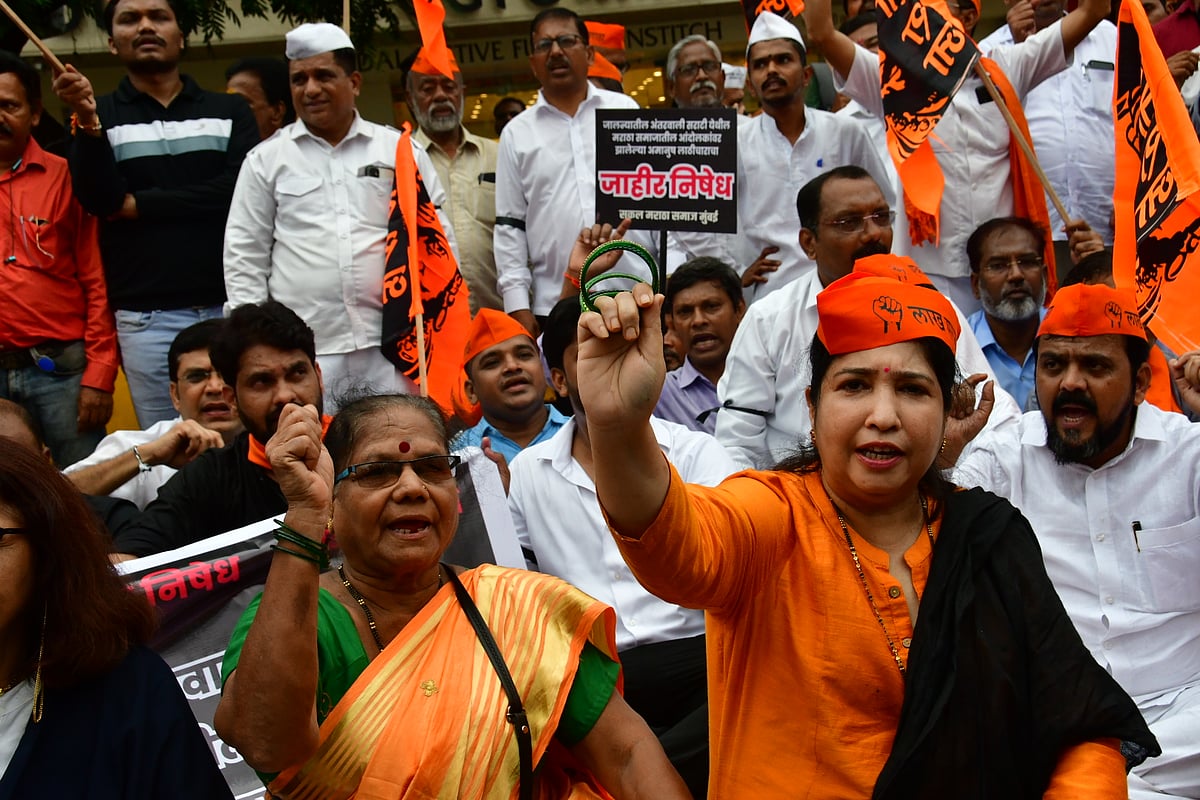What's behind Jalna? BJP has its hands full as Maratha reservation issue flares up
Devendra Fadnavis is back to square one and could face a major electoral setback with Marathas making up 33 per cent of the voting population

Things seem to have come full circle for Devendra Fadnavis, Maharashtra’s deputy chief minister, over the Maratha reservation issue.
With the Other Backward Classes (OBC) issue close to resolution, Marathas were bound to get restless about a quota in jobs and educational institutions that they have been agitating about since 2016, when Fadnavis was chief minister. He seemed to resolve the problem by passing a Socially and Economically Backward Classes act (SEBC) that offered 16 per cent reservation.
But as always happens with the BJP, no thought was given to Constitutional provisions, and the act was bound to have been struck down by the Supreme Court. When the apex court decision finally came in 2021, Fadnavis and the BJP were not beyond going to town demanding the resignation of the then Maha Vikas Aghadi government for failing to protect the interests of the Marathas as his government had.
But now the boot is on the other foot. As of now, the government of Eknath Shinde, himself a Maratha, and Fadnavis have been unable to resolve the problem. Add to it the fact that the Shinde-Fadnavis government is now top heavy, with many more Marathas who entered it along with Ajit Pawar.
So when the police lathi charged Marathas protesting for reservation outside the Agricultural Produce Market Committee and violence erupted in the Jalna region, the situation could have been tailormade for MVA leaders to step in and put the Shijde-Fadnavis-Ajit government on the mat.
The Congress is focusing on Fadnavis heading the home department and allowing the police violence against the agitators to go unchecked. Sharad Pawar and his Nationalist Congress Party leaders are pointing fingers at Ajit and his men. Uddhav Thackeray and his son Aaditya, having had little connect with Marathas in the past, have seized the opportunity to point out that a Maratha chief minister has unleashed violence against fellow Marathas and has been unable to resolve the issue despite past promises.

The imbroglio could not have come at a worse time for those leading the Maharashtra government, with barely six months to go for the Lok Sabha elections. Moreover, farmers are already very upset with the BJP regime, both at the Centre and the state. In Maharashtra, the farming community comprises mostly Marathas and their subsect Kunbis, who together make up 33 per cent of the voting population. The BJP simply cannot afford more alienation at this stage, but the time left to them before the polls is too little to resolve the issue to everybody’s satisfaction.
In striking down the SEBC Act, the Supreme Court insisted that no special reservation can be given to any community that will take the total quota over 50 per cent. The government then thought they could fit them into the economically backward classes category, but there were howls of protest from them as well as the OBC community, who declared they were not against reservations for Marathas, but would not stand for their own quotas being reduced and diverted to them.
The Marathas have always been the ruling class of Maharashtra, with the bulk of chief ministers hailing from the community. During the Mandal Commission agitation, then chief minister Sharad Pawar had turned down their demand for reservations, saying they could not call themselves OBCs, and that as a ruling class they could not claim to be economically and socially backward as other OBC and Dalit groups could.
For years after that, nothing happened until with shrinking land holdings, increasingly lower minimum support prices and failing agriculture, Marathas found themselves being edged out of the economy, and consequently in social status.
Now Pawar, too, supports the demand for reservations to his community and it was not surprising that he and fellow Maratha Ashok Chavan of the Congress should be the the first to rush to Jalna to sympathise with the agitators and promise them their demands when they came to power next.
However, as even the Congress and NCP have seen when they were in power, it is not an easy demand to meet. They offered five per cent reservation to Marathas and Muslims just before the 2014 elections, but lost the polls anyway because neither community was convinced that the decision would stand the test of the courts.
Despite going through a more elaborate process of giving them reservations, even Fadnavis’ decision was junked by the Supreme Court, and this seems to be developing into one of those situations where no one can win.
For this reason alone, the BJP would probably rather not be in government right now, with so many Marathas on board. For the MVA has now sunk its teeth into the issue, and with no resolution in sight, the situation could only go downhill for the government and the BJP.
Follow us on: Facebook, Twitter, Google News, Instagram
Join our official telegram channel (@nationalherald) and stay updated with the latest headlines
